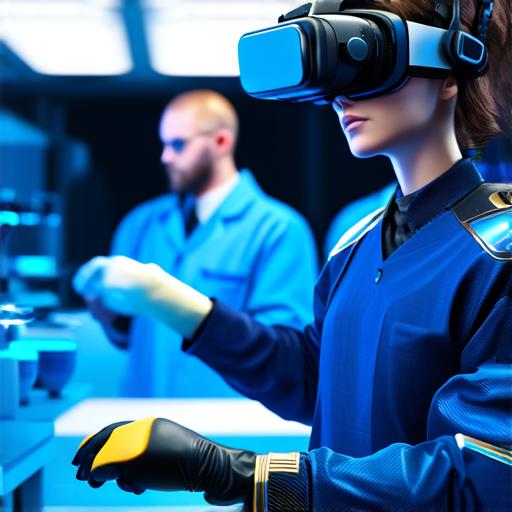Virtual reality (VR) technology is transforming industries across the board, and drug development is no exception. By using VR tools, researchers can create realistic simulations that allow them to test drugs and their effects on the human body in a safe and efficient way. In this article, we’ll explore the advantages of using virtual reality in drug development and how it’s helping to speed up the process of bringing new treatments to market.
Simulation Advantages
One of the biggest advantages of VR in drug development is the ability to simulate real-world scenarios. Researchers can create highly detailed simulations of human anatomy, allowing them to test drugs and their effects on the body without having to perform live tests on humans or animals. This not only saves time and money, but also reduces the risk of harm to living beings.
For example, researchers at Stanford University have used VR to create a simulation of the human lung that can be used to test the effectiveness of new drugs for treating lung diseases. The simulation allows researchers to model the effects of different drugs on the lung tissue and see how they interact with other organs in the body. This information can then be used to develop more effective treatments for these diseases.
Another advantage of VR in drug development is the ability to test drugs in a controlled environment. By using VR simulations, researchers can create conditions that mimic real-world scenarios, but with greater precision and control. This allows them to study the effects of drugs on specific organs or tissues, without the distractions and variability of a real-world environment.
For example, researchers at Massachusetts Institute of Technology (MIT) have used VR simulations to test the effectiveness of new drugs for treating cancer. By creating highly detailed models of tumor cells, they were able to simulate the effects of different drugs on these cells and see how they interact with other cells in the body. This allowed them to develop more effective treatments for this deadly disease.
Time and Cost Savings
Virtual reality can also help speed up the drug development process by saving time and money. By using VR simulations, researchers can test drugs and their effects on the human body in a safe and efficient way, without having to perform live tests on humans or animals. This not only saves time and money, but also reduces the risk of harm to living beings.
For example, researchers at the University of California, San Francisco (UCSF) have used VR simulations to test the effectiveness of new drugs for treating addiction. By creating highly detailed models of the brain and nervous system, they were able to study the effects of different drugs on these structures and see how they interact with other organs in the body. This allowed them to develop more effective treatments for this debilitating disease, without the need for expensive and time-consuming live tests.
In addition to saving time and money, VR can also help researchers identify potential issues with new drugs early on in the development process. By using VR simulations to test drugs on virtual organs and tissues, researchers can identify potential problems before they occur in live tests, allowing them to make adjustments and improve the safety and efficacy of the drug.
Real-Life Examples

Virtual reality is already being used in a number of real-life examples to speed up the drug development process. For example, the pharmaceutical company Merck has used VR simulations to test new drugs for treating cancer. By creating highly detailed models of tumor cells and their interactions with other organs in the body, they were able to study the effects of different drugs on these cells and see how they interacted with other structures in the body. This allowed them to develop more effective treatments for this deadly disease.
Another example is the company Sentrian, which has used VR simulations to test new drugs for treating chronic pain.
